Picture yourself at a yard sale on a weekend morning. You can find used furniture, clothes and toys from kids who left home for college a few decades ago, some kitchen gadgets that were “As seen on TV” back in the 1980s, and so on. But what really has your spidey sense screaming is a big cardboard box half-buried under a pile of clothes hangers. What’s in the box? Is it a bunch of snakes? A plague? A dozen VHS copies of the Doctor Who TV movie? Actually, it’s probably a bunch of used romance novels, $0.25 each or $5 for the whole box.
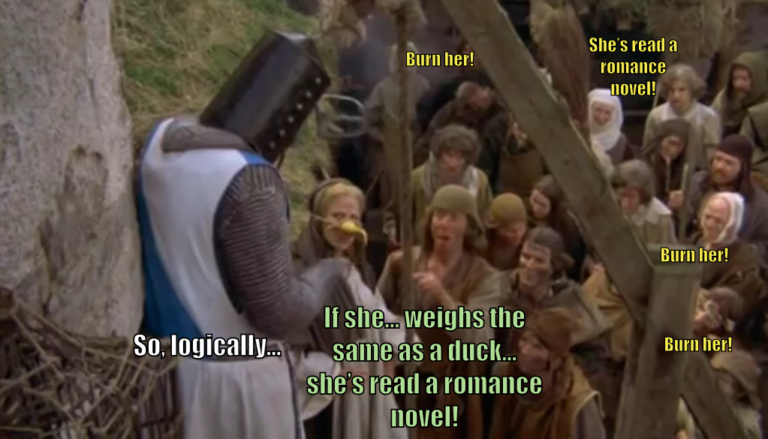
This is what happens when you allow bridges to be made of stone…
Okay, you might say, so maybe romance novels are crap, but are they actually dangerous? Of course not. And, having read less than one full paragraph of a romance novel (I decided that I didn’t really need to know how that vacuum cleaner-induced abortion turned out), I am entirely unqualified to actually call them crap. Rather, I suspect Sturgeon’s Revelation applies here, just as it does to sci-fi, literary fiction, math textbooks, the “good” 10% of math textbooks, self-help books, and pretty much any other publications I can think of. Really, though, I’m not the best person to defend romance novels. For that, I’ll defer to Sarah Wendell of Smart Bitches, Trashy Books and author of Everything I Know About Love I Learned from Romance Novels. On page 6 of that book, she writes
Ironically, many people who disdain the romance genre and look down on the women who read it presume that reading about courtship, emotional fulfillment, and rather fantastic orgasms leads to an unrealistic expectation of real life. If we romance readers are filling our own heads with romantic fantasies, real men and real life won’t and cannot possibly measure up to our fairy-tale expectations, right? Wrong. Wrongity wrong wrong wrong. That accusation implies that we don’t know the difference between fantasy and real life, and frankly, it’s sexist as well. You don’t see adult gamers being accused of an inability to discern when one is a human driving a real car and when one is a yellow dinosaur driving a Mario Kart, but romance readers hear about our unrealistic expectations of men almost constantly.
Does this sound familiar? It’s exactly what people said about novels in general, but instead of people in the 1800s saying it, people in the 21st century are.
However, people do suggest that video gamers can’t tell fantasy from reality, and Breitbart, a pretend-news site that provides spin for white supremacists and other hate groups, actually has an article calling for Mario Kart to be banned. The diference between suggesting video gamers can’t tell fantasy from reality and suggesting that romance novel readers can’t is that, if you type “Mario Kart dangerous” into a search engine, you will get fifteen or twenty links to people describing research that suggests playing Mario Kart is actually good for driving skills before you even see the Breitbart piece, whereas if you type “romance novels dangerous” into a search engine, the first few pages of results are all very serious warnings about the danger of romance novels.

It’s probably because they are so far behind everyone else.
So who says romance novels are dangerous? A lot of the articles you’ll find in back issues of newspapers or magazines, or cluttering up your search results, are based on an article published by KSL.com, a website affiliated with Salt Lake City’s KSL television channel and radio station. Yeah, it’s Utah, but no, this isn’t some wacky LDS thing. The LDS Church has no issues with romance novels. Hot drinks? Yes. Pornography? Yes. Romance novels? No. So, if you see someone on the Internet giving pretty intense coverage to a second-grade science fair project that compares the growth of plants watered with Coke, Pepsi, boiling water, and ground-up unlabeled VHS tapes found in an unmarked box in the basement, feel free to blame it on the LDS Church. But for this one, focus your blame on the people actually involved.
The article is “Romance novels can become addictive”, by Kimberly Giles. Before I say anything about who Kimberly Giles is, let me just say that I don’t believe you automatically need a graduate degree in a field to say something intelligent about it, and that having a graduate degree in no way qualifies you to say anything intelligent at all. See, for example, James Baldwin, Ph.D., or Berkeley math professor Robion Kirby’s pathetic attempt to apply basic mathematics to a serious issue. Starting off a paragraph this way is kind of like prefacing a comment with “Now I’m not racist, but…” in that any reasonably intelligent reader now has a very good idea where this is going. Kimberly Giles spent two years at Brigham Young University, plus another year at San Jose State University. Her Linkedin profile is pretty vague about what she studied and whether she got a degree, but given that she has to brag about having a certificate as a Master Coach from an organization that she founded, I’m going to guess her answer to “What exactly did you study in college?” would be “Bzzzz! Bzzzz! That’s my phone, and totally not me making a buzzing sound. I’ve got to take this call… somewhere far away from you.”
As it said before, though, there are still plenty of topics you can still stay intelligent things about without having any formal training. If you’ve read any of the previous installments in this series, though, you’ll probably be aware that the figuring out whether novels are dangerous or not, despite being extraordinarily simple, is somehow not one of those topics. Giles inform us that “[m]any women do not see their love for reading romantic books as a problem, while others are admitting dissatisfaction in their marriages that may stem from reading these types of books.” She also seems pretty confident when she writes “[w]omen may find their standard for intimacy begins to change over time because may not be able to get as satisfied with their partners as they can reading a book.”
I know what you’re thinking. “Does Giles coincidentally have a suicide note from a confirmed romance novel reader at hand that she can quote from?” I’m sad to say that she does not. She does, at least, quote from several other people who also have no idea what they are talking about. First, she quotes Shaunti Feldhahn, an evangelical author with a background in business and economics. According to Giles, Feldhahn says “In fact, some marriage therapists caution that women can become as dangerously unbalanced by these books’ entrancing but distorted messages as men can be by the distorted messages of pornography”. Look, Feldhahn, it’s cool that you may or may not have actually talked to some marriage therapists before saying that, but “some” is not exactly a high bar. I can find some marriage therapists who think the world is flat, that vaccines are dangerous, or that Shaunti Feldhahn is a qualified social science researcher. I’m not being mean to marriage therapists here. The same is true for pretty much every field. Also, there is a pile of really sketchy research and a whole lot more wild, uneducated speculation about just how dangerous pornography is, but so far as I know, there isn’t any reputable research to back any of those claims up. That, though, is a The Kids These Days for another day.
To Giles’ credit, she does at least describe Feldhahn as “a best-selling author” instead of doing as many other people have and trying to pretend that Feldhahn is a trained social science researcher. According to her biography, she
received her graduate degree from Harvard University and was an analyst on Wall Street before unexpectedly becoming a social researcher, best-selling author and popular speaker. Today, she applies her analytical skills to investigating eye-opening, life-changing truths about relationships, both at home and in the workplace. Her groundbreaking research-based books, such as For Women Only, have sold more than 2 million copies in 23 languages and are widely read in homes, counseling centers and corporations worldwide.
I think the phrase “before unexpectedly becoming a social researcher, best-selling author and popular speaker” is great, specifically the “unexpectedly” part, and I’m going to have to work that into the next bio I have to write for myself. From all that, you’d think Feldhahn would have at least some passing familiarity with research protocols and statistical analysis. Not a lot, maybe, since people often aren’t expected to do a lot of that kind of stuff in master’s programs, but who knows. However, if you check out one of her “groundbreaking research-based books” like For Men Only, you’ll see that either Feldhahn didn’t get a lot of useful research experience in grad school or she decided it was too much work for too little reward. If you check page 10, you’ll see that she did in fact work with some actual researchers (I assume, since all I know about Decision Analyst is that they do marketing research) to design a “groundbreaking survey of four hundred women from all over the country.” Asking four hundred women is groundbreaking? Excuse me while I add “double super extra groundbreaking” to the description of my master’s thesis in my CV. Still, despite the hype, that’s way better than I was expecting. But a well-designed and honestly-conducted survey of a few hundred people is only about 6% of their total data, and it doesn’t sound like the other 94% was gathered in any scientifically or statistically responsible way. Is that bad?
If you aren’t familiar with social science research, try to imagine that instead of reading page 10 of For Men Only, you’ve just walked into the kitchen of a restaurant that claims to have “Five Mitchell Anne Stars!” Someone has a parakeet in a cage over the sauté station. There is no newspaper lining the bottom of the cage, and the parakeet suffers from IBS. There is a urinal in the middle of the salad station, and nobody in the kitchen seems to have good aim. The chef de cuisine is coughing blood, has been for a while, and has reached that stage where they can’t be bothered to cover their mouth. The food storage areas don’t actually have any sort of climate control. Instead, they have paper snowflakes glued to the walls. A family of possums has taken up residence in the only functional sink. And, in the middle of all of this, there is a sign saying “Please wash your hands before working at the fry station.” That sign is their “groundbreaking survey of four hundred women from all over the country.”
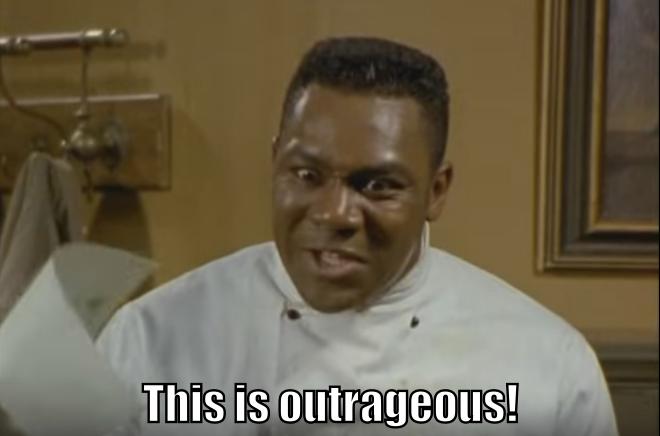
Chef Gareth Blackstock is outraged that the “Please wash hands” sign got moldy and nobody taped another one over it.
If you want a book that isn’t as densely packed with research-based science and confusing Greek- and Latin-based technical terminology as Men Are from Mars, Women Are from Venus; that doesn’t do such a nuanced, thoughtful, subtle analysis of gender roles as Everybody Loves Raymond, Home Improvement, or Married… with Children; and that just vomits trite sexist stereotypes all over you, Feldhahn’s got you covered. I’ve tried reading For Men Only, but I just can’t get over the very clear impression that it’s just a bunch of sexist BS delivered in the most insulting way possible. Fortunately for me, Libby Anne over at Patheos has taken the time to point out a few other issues with Feldhahn.
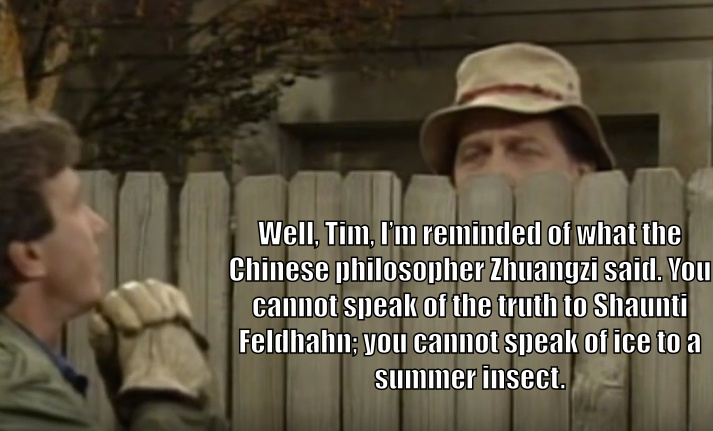
On point as always, Mister Wilson.
Honestly, I feel pretty safe disregarding anything Shaunti Feldhahn may have to say on the topic of romance novels. Who is the next “expert” that Giles feels the need to quote? It’s Dr. Juli Slattery, who informs us that “[t]here is a neurochemical element with men and visual porn, but an emotional element with women and these novels”. Uh… From what I can find on Google in about three minutes, Juli Slattery at least claims to have a graduate degree in psychology from an actual accredited university. Maybe that quote is taken out of context, because as it stands, it sounds a whole lot like she doesn’t have even the faintest idea of what a brain is or how it works. Eating chocolate has a neurochemical element to it. So does exercise. So does reading a book about numerical methods for partial differential equations. So does laughing. So does scratching your backside. It’s literally how the brain works. Here’s a test to see if something you are thinking of doing has a neurochemical element:
Will it involve even one cell of your brain to accomplish?
Yes: Yes, it has a neurochemical element!
No: You probably didn’t think that through well enough. Is it something you are planning to do? Start over and pick yes.
Dr. Slattery contrasts how the brain works, which is apparently unique to men, with emotional, which is apparently how women work. I know there is some research that suggests that at least some of our feelings are mediated by other parts of our body, but I’m pretty sure emotional elements are also neurochemical elements, since (a) emotions still somehow involve the brain, (b) neurochemicals are what the cells in your brain use to interact, and (c) just two paragraphs later, Giles informs us that women “can experience the same addicting chemical release as men do” from reading romance novels. Imagine if you took your computer to a computer expert to get help with a virus, and the expert dunked it in a big bucket of penicillin in oral suspension, saying “I’m pretty sure penicillin kills viruses and stuff.” And yes, I know the difference between a bacterium and a virus.
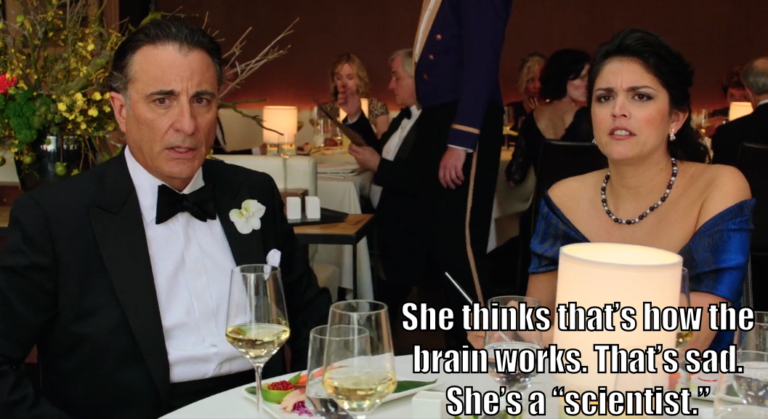
Whatever’s going on with Mayor Bradley over there, I’m willing to be there’s a neurochemical element to it.
Also, the good Doctor isn’t afraid to bring up the whole “men are visual, women are emotional or verbal” thing. Dr. Slattery and I apparently know very different women. Even if you ignore the fact that most visual erotica is specifically aimed at men, we know very different women. Is there any actual research on this? Well, sort of. As Dr. Leticia Anne Peplau, the author of the article “Human Sexuality: How Men and Women Differ,” says, most of those differences are not particularly large. Also, Dr. Peplau laments the fact that
much research is based on White, middle-class American samples. Studies of other populations and cultural groups would be valuable in assessing the generalizability of findings.
If only there were some way to make that happen! But, basically, research suggests that white American men and white American women may differ in relatively small ways on this topic, or they may just feel that they have to say they differ in relatively small ways on this topic. I can only assume that being a psychologist who actually does stuff with different cultures must be like being the only teacher in your department who has ever heard of educational research, or the only person on your sports team to understand that you need to get points to win the game.
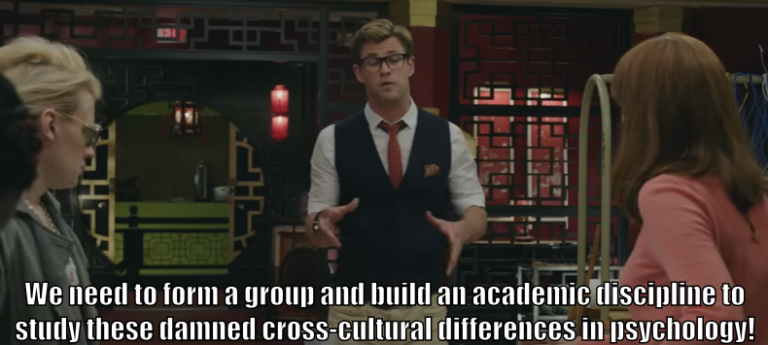
Kevin would be shocked to learn that dozens of psychologists across the world are aware of the existence of other cultures. In my experience, though, many of them don’t let that influence their research at all.
Whether or not that quote was taken out of context, Dr. Slattery was working for Focus on Family when Giles wrote her article. Focus on the Family is one of those organizations of religious zealots that tries to set fire to anything that offends any of its extremely easily offended members. It isn’t too keen on things like evidence or science, since those tend to offend most of its members. Honestly, I’d feel pretty safe disregarding anything Dr. Slattery says at this point. However, Giles has one more quote from the good doctor that really sums up what’s going on here. “For many women, these novels really do promote dissatisfaction with their real relationships”. There we go. A woman who reads a romance novel might suddenly realize that her husband doesn’t pay any attention at all to her needs, or actually treats her like shit, or is an abusive asshole. This is what Ruskin and More, among others, warned us about, except that for them it was about class. Here, it’s about gender.
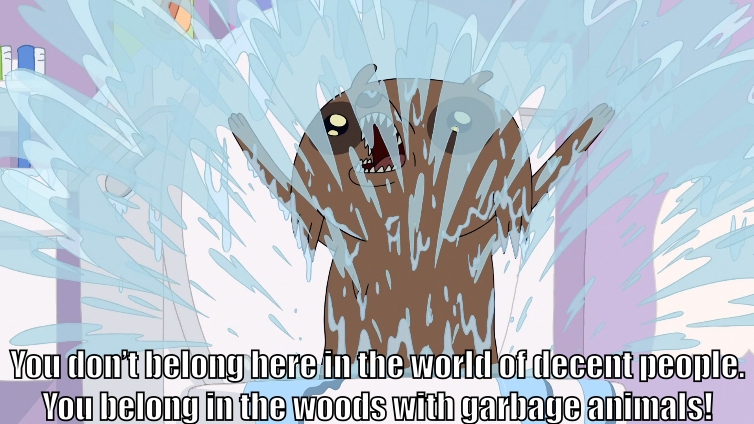
I’m going to get a lot of hate from garbage animals on this one.
This would be a good time to bring up Dr. Slattery’s book. Giles calls it Finding the Hero in Your Husband, but the full title is Finding the Hero in Your Husband: Surrendering the Way God Intended. I can’t even begin to imagine why Giles left out that last bit. Slattery has a whole chapter on what exactly submitting is and is not. She explains on page 49 that the version of “submission” that she is looking for comes from Greek, and was often used as a military term. Yup, ladies, just think of your husbands as drill sergeants. Reading through this burning garbage pile of a book, I get the impression that Dr. Slattery has had a lot of married women come to her for therapy because of their husbands. I also get the impression that she has realized this, and then done the extra legwork to completely miss the point. She clearly knows that a lot of women are unhappily married to abusive assholes, but in her world, it’s the women who are messing everything up. These women, she says, shouldn’t be wasting everyone’s time trying to be fully functional, self-actualized, autonomous human beings. Those women have unreasonable expectations if they want their husbands to treat them like actual humans, she informs us, because those women have been selfishly trying to live their own lives rather than helping their husbands live theirs. On page 9, we have this gem:
A woman never marries the man of her dreams. She helps the man she marries to become the man of his dreams.
The first time I read this, I thought it was the stock “marry anybody who won’t murder you before the wedding and then spend the rest of your life molding them into a crude semblance of a human being” advice that American society seems to have bought into. That’s pretty bad on its own, since it either assumes that decent men don’t exist or that most women don’t deserve one. But that’s not actually what Dr. Slattery says there. See, I missed the “man of his dreams.” [emphasis mine] That changes it from “marry a monster in a human suit and do whatever it takes to train him not to murder you” to “marry a monster in a human suit and be his slave so he won’t have a good reason to murder you.”
Many years ago I got on a train and sat down next to the only available power plug. This put me about two seats away from the only other occupant, a woman who was probably in her twenties. After a few minutes, an older man got on and, although he had the had at least two dozen other pairs of seats to pick from, chose the seat next to her. At least he asked if it was okay to sit there. He immediately asked if she was married and, when she said she was not, why not. She seemed pretty used to doing this and started debating with him. I tuned back into the conversation when she asked, “Do you think it’s okay for a husband to beat his wife?” His response was something like, “No, of course not! A woman should never disobey her husband so he is forced to beat her.” That’s when she told him that he needed to find another seat.
Society (and not just American society, either) puts an unreasonable amount of pressure on women to get married as soon as possible. It tells women that they aren’t really valuable except as wives and mothers, and that it’s better to marry anybody and put up with anything rather than to be single. Slattery is pushing exactly this kind of thing, and she is terrified that women who read romance novels might start to expect guys to not walk all over them. I was able to write a long analogy for Feldhahn’s little research study, and a short one for Slattery’s complete in ability to understand how the brain works, but I can’t do one for this. The whole thing makes me feel icky. I’m going to go take a shower, and when I come back I’ll look at the third uninformed doofus Giles quotes.
Turns out the shower didn’t help. Let’s get this over with. Giles says that women may find their standard for intimacy changing, as though that’s a bad thing, and she has one last quote up her sleeve: “Women involved in pornography have a hard time keeping their family together.” This is from Vickie Burress, who may or may not be a pornography addiction counselor. Giles describes her as such, but I haven’t seen that mentioned in a bio of her. All I’ve been able to find is that she “survived a victim relationship of pornography and has now dedicated her talents to preventing others from being victimized and assisting those already victimized” and that she is a “former wife of a porn addict”. This may qualify her to hold strong opinions on the topic of pornography, but it doesn’t make her a licensed pornography addiction counselor.
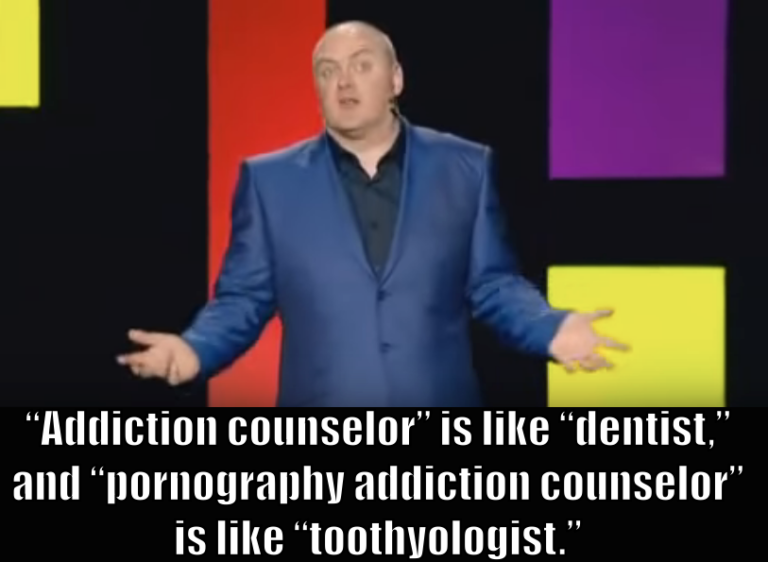
Actually, I recommend you watch this six-minute rant that this picture comes from1, and possibly check out the rest of Dara O’Briain’s work.
Oh, and apparently she has managed to work for two organizations that made the Southern Poverty Law Center’s list of hate groups. Actually, she was the president of one and the founder of another. So I don’t think we even need to get to Burress’ awful assumption that women are the only ones responsible for keeping their families together. I don’t feel the need to have faith in anything she says, unless it comes with quite a lot of empirical evidence.
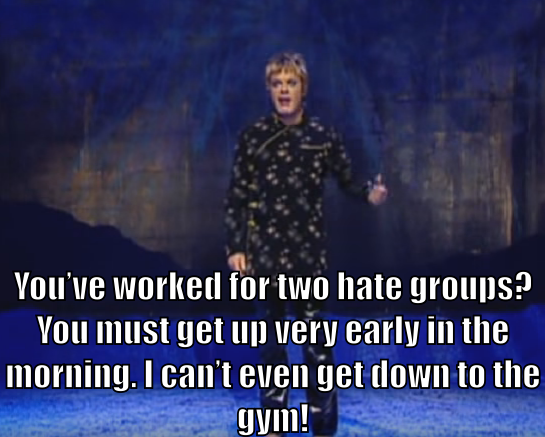
Don’t tell him that she actually founded one of them.
Hilariously enough, Giles appears to have plagiarized much of her article from a 2007 Woman to Woman piece by Diane Glass and Shaunti Feldhahn. Yes, Giles plagiarized quite a lot of her article from one of the people that she quoted! I am so done with all of these people, but if you want to see a few other people’s take on Giles’ version of Feldhahn’s article, the folks at Smart Bitches, Trashy Books have not one but two posts about it. You might also enjoy the article entitled Bad Analogies Can Be As Addictive As Chocolate. And, if you want a takedown written by people with real college degrees from real colleges who actually do real research on relevant topics and are not on the executive boards of any hate groups, you might want to check out this site.
But this was an issue before Giles stole Feldhahn’s piece, and before Feldhahn’s piece, too. There’s this, from 2006, this, from 2001, this, from 1998, and this article from 1996 claiming that romance novels are a gateway to pornography. You can also check out this interesting history of women’s dime novel romances, and specifically the criticism people leveled at them. And don’t forget Clara Reeve from earlier in this series. I’ll repost that great quote from The Progress of Romance.
There are yet more and greater evils behind.–The seeds of vice and folly are sown in the heart,–the passions are awakened,–false expectations are raised.–A young woman is taught to expect adventures and intrigues,–she expects to be addressed in the style of these books, with the language of flattery and adulation.–If a plain man addresses her in rational terms and pays her the greatest of compliments,–that of desiring to spend his life with her,–that is not sufficient, her vanity is disappointed, she expects to meet a Hero in Romance.
Much of the criticism boils down to the idea that the people in romance novels are so unnaturally perfect that no mere mortal could possibly begin to measure up to them, but a few accidentally admit that some of the problem may be that there are some pretty sub-par husbands out there. This one (which was deleted from its original site for some reason) says that women seek out romance novels “when life isn’t going the way you wanted and you need something to make you feel good, and usually that’s because your husband isn’t.”
So far I’ve mostly said mean (but not unjustified) things about the people who write about how dangerous romance novels are, their complete inability to understand basic concepts that might help them make their case, and their motivations. But a claim is not automatically false just because clueless, dishonest, and downright evil people are willing to believe it without evidence. I mean, Aristotle believed the Earth was a sphere, but he also had a lot of dumb ideas that he believed without seeing a real need for what we would consider empirical evidence. Here is where my unfamiliarity with romance novels could get me into trouble. From what I’ve read about the history of the genre, romance novels have changed over the years. For example, in the Tucson Daily Citizen, from May 29, 1976, we have an article that describes romance novels as being strongly opposed to the women’s liberation movement. Says one romance writer they quote, the women’s liberation movement is “more Fascist than Fascism”, and she asks, “What is more shrill than a militant female?” I’ll cut this person some slack, since 1976 was probably too early to hear all the 14-year-old boys upset over Ghostbusters, but not much slack. Everything I Know About Love I Learned from Romance Novels” mentions that “rapetastic romances are a thing of the past” on page 113, and on page 131 mentions that romance novels more recently entered “the golden age of less rapeyness.” So, like lots of media, they appear to be generally getting more responsible and less problematic over time. Keep in mind, though, that while some of the people who object to romance novels object to the sex (but, oddly, usually not the rapeyness), many of those folks are focusing specifically on sex-free (and, one would hope, rape-free) Christian romances. While, as Alyssa Cole points out, the genre could be better about including a wider range of authors and catering to a wider range of readers, according to this Jezebel article it is slowly improving. Like pretty much every genre. And, honestly, if you work in the computer industry, teach mathematics, study physics, play video games, enjoy philosophy, listen to music, or love pencil and paper RPGs, you are in no position to criticize the romance novel industry.
| Stock Attack | Used? |
|---|---|
| Stimulation of violence, sadism, and criminality | ❌ |
| Undermining of sexual morality and legitimate authority | ✅ |
| Promotion of passivity through narcotization, hypnosis, and desensitization | ❌ |
| Substitution of fantasy for reality; promotion of escapism | ✅ |
| Promotion of stereotypy, distortion, oversimplification, and irrelevance | ✅ |
| Deliberate emotional manipulation and exploitation of consumers | ❌ |
| Destruction of literacy | ❌ |
| Weakening of family ties | ✅ |
| Destruction of artistic integrity and creativity in society | ❌ |
| Homogenization of culture at the lowest level | ❌ |
| Promotion of materialism and conformity | ❌ |
| Making readers less intelligent | ❌ |
| Posing an actual physical risk to health | ❌ |
| Being addictive in the same way that drugs or alcohol are | ✅ |
| Being metaphorically (or literally) infectious, toxic, or venomous | ❌ |
| Causing the end of some mythical golden age, or at least reminding us of its end | ❌ |
| Being fun or pleasant, since nothing fun or pleasant can be good for you | ❌ |
| Total: | 5 |
Feldhahn pretended to have done real research, and Dr. Slattery is sure to always use that prefix, even though her graduate degree in psychology apparently didn’t include even so much as a high school-level understanding of what the human brain is made of. Is there any research on romance novels that has, say, been peer reviewed and published in an academic journal? Yes. Yes, there has. If you assume that the peers reviewing a charlatan are also charlatans, and that “academic journal” can be applied to pretty much anything that is willing to publish things written by people who may have once been on a college campus. That’s something that we can look at next time.
1: Just keep one thing in mind as you listen. Dara makes it sound like modern medicine has been thoroughly researched and found to be awesome, and that literally everything else has also been thoroughly researched and found to be junk. This isn’t true. For example, here is one of dozens of research articles about how doctors still believe that black patients aren’t capable of feeling as much pain as white patients. And how about the fact that, until the last few years, drugs often weren’t tested on women? Yes, that matters.
As Dara said, medical science knows it doesn’t know everything. Otherwise, it would stop. But it’s good to keep in mind that, in some cases, medical science hasn’t really started yet. Thinking that medical research has examined everything that doctors do is probably about as dangerous as thinking that you can make up your own silly stories about anything that medical science hasn’t covered very thoroughly.

